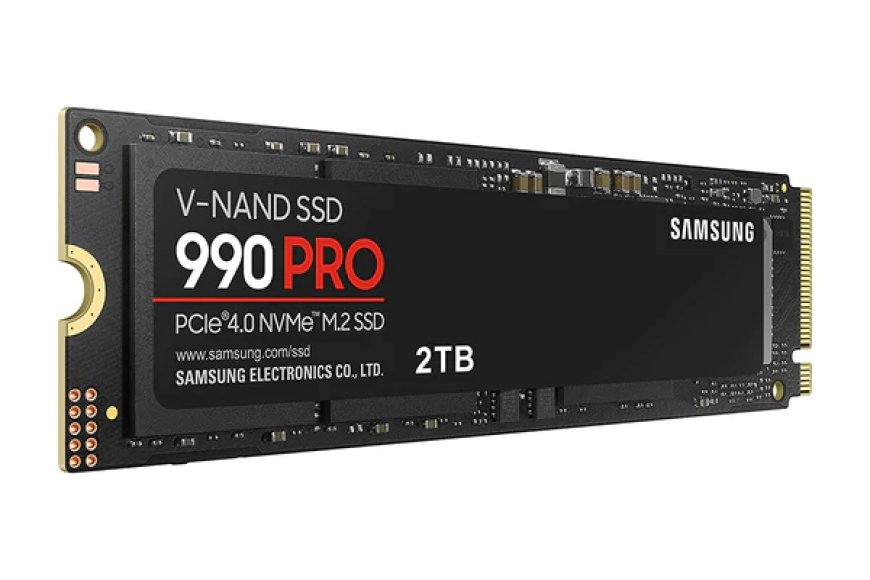Samsung's 990 Evo: Bridging the Gap with Hybrid PCIe Technology
Samsung, a renowned name in the world of SSDs, has unveiled an intriguing addition to its lineup – the Samsung 990 Evo NVMe SSD. In an unexpected turn of events, the product page for this upcoming SSD has been inadvertently published, providing us with an early glimpse of its marketing and hardware specifications. While Samsung is best known for its high-end SSD offerings, such as the 990 Pro, the 990 Evo takes a slightly different path, firmly establishing itself as a midrange drive. In this comprehensive exploration, we delve into the features, specifications, and unique characteristics of the Samsung 990 Evo.

A Midrange Marvel: Samsung's 990 Evo
At first glance, the Samsung 990 Evo may not stand out as a top-tier SSD, with read and write speeds capped at 5,000MB/s and 4,200MB/s, respectively. However, what truly sets the 990 Evo apart is its distinctive configuration – it combines four PCIe 4.0 lanes with two PCIe 5.0 lanes. This hybrid approach introduces an intriguing twist to the world of SSD technology.
Also check HP Omen 27qs 240 Hz Gaming Monitor: Unveiling Solid Performance and Exceptional Value
The Unique Selling Point: PCIe 5.0 and 4.0 in Harmony
The standout feature of the Samsung 990 Evo is undeniably its support for PCIe 5.0, albeit with just two lanes. This two-lane PCIe 5.0 configuration is equivalent in bandwidth to the four-lane PCIe 4.0 option that the drive also offers. It's important to note that PCIe 4.0 SSDs function seamlessly when connected to PCIe 5.0 slots, leaving us with the question of why the 990 Evo embraces PCIe 5.0, especially when its performance is not constrained by its PCIe 4.0 connection.
Unveiling the Niche Scenario: A Unique Bandwidth Challenge
While the advantages of PCIe 5.0 for the 990 Evo may seem unclear at first glance, there is a niche scenario where these two PCIe 5.0 lanes prove to be valuable. This scenario arises when the data connector has only two lanes available. In such a situation, a PCIe 4.0 SSD connected to a PCIe 5.0 interface with two lanes will be limited to utilizing just two lanes. Consequently, its bandwidth is effectively halved from the potential 8,000MB/s of PCIe 4.0 to 4,000MB/s.
Understanding PCIe Technology: Bridging the Generational Gap
To grasp the significance of the Samsung 990 Evo's hybrid PCIe approach, let's delve deeper into the world of PCIe technology and its generational evolution.
1. PCIe 4.0: The Reliable Workhorse
PCIe 4.0 has been a trusted workhorse in the realm of SSDs, offering substantial bandwidth and impressive data transfer rates. With a bandwidth of 8,000MB/s per lane, it has powered many high-performance SSDs, including Samsung's own 990 Pro. PCIe 4.0 has proven itself as a robust and dependable choice for demanding computing tasks.
2. PCIe 5.0: A Leap in Bandwidth
PCIe 5.0, the successor to PCIe 4.0, takes a significant leap in terms of bandwidth. It doubles the per-lane bandwidth to 16,000MB/s, ushering in a new era of speed and performance. This leap in bandwidth is particularly advantageous for tasks that demand lightning-fast data transfer rates, such as gaming and content creation.
3. Hybrid Approach: Maximizing Compatibility
The Samsung 990 Evo's hybrid approach combines the strengths of both PCIe 4.0 and PCIe 5.0, creating a versatile solution. While it primarily operates with PCIe 4.0 performance, it seamlessly adapts to PCIe 5.0 slots, catering to users with varying hardware configurations. This flexibility ensures that the 990 Evo can deliver its full potential, regardless of the available PCIe interface.
The Niche Scenario: Two Lanes, One Solution
In scenarios where hardware limitations restrict the available lanes to just two, the 990 Evo's utilization of PCIe 5.0 becomes pivotal. Without PCIe 5.0 support, a PCIe 4.0 SSD connected to a two-lane PCIe 5.0 interface would be constrained, experiencing a reduction in bandwidth. However, with the 990 Evo's two PCIe 5.0 lanes, it can fully harness the available bandwidth, delivering optimal performance even in this unique setting.
Looking Ahead: The Future of SSD Technology
The Samsung 990 Evo's hybrid PCIe approach raises intriguing questions about the future of SSD technology. While it may appear niche today, there is potential for broader applications and implications down the road. Here are some considerations for the future of SSD technology:
1. Versatile Compatibility: Meeting Diverse Needs
As hardware configurations continue to evolve, SSDs that can seamlessly adapt to various PCIe interfaces will become increasingly valuable. The 990 Evo's ability to cater to both PCIe 4.0 and PCIe 5.0 environments sets a precedent for versatile compatibility, ensuring that users can maximize their SSD's potential, regardless of their setup.
2. Evolving Use Cases: Beyond Traditional Computing
The demand for high-speed data transfer extends beyond traditional computing tasks. SSDs like the 990 Evo, with their hybrid approach, may find applications in emerging fields such as data-intensive AI, 8K video editing, and real-time simulations. The ability to leverage the full bandwidth potential of available PCIe lanes will be crucial in these contexts.
3. Gaming Advancements: Enhancing Gameplay
The gaming industry is perpetually pushing the boundaries of performance and immersion. SSDs that can optimize their bandwidth in various PCIe environments may contribute to smoother gaming experiences, reducing loading times and enhancing gameplay fluidity.
Conclusion: Samsung's 990 Evo - A Hybrid Innovation
In conclusion, the Samsung 990 Evo NVMe SSD is a testament to innovation in the world of storage technology. Its hybrid PCIe 4.0 and 5.0 configuration showcases the adaptability and versatility that future SSDs may embrace. While it may currently serve a niche scenario, the implications of this hybrid approach extend far beyond, hinting at a future where SSDs seamlessly bridge generational gaps, ensuring optimal performance in diverse hardware environments. Samsung's 990 Evo stands as a promising glimpse into the evolving landscape of SSD technology, where versatility and compatibility are paramount.


































